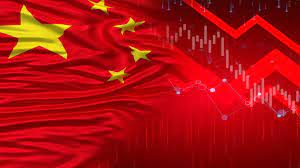
In November, factory-gate deflation intensified and consumer prices in China dropped for the first time in three years. This suggests that deflationary forces are intensifying as the economic recovery is questioned due to weak domestic demand.
According to data released on Saturday by the National Bureau of Statistics (NBS), the consumer price index (CPI) decreased by 0.5% from October and from a year ago.
That was lower than the median predictions in a Reuters survey, which showed 0.1% declines on a monthly and annual basis. The CPI reduction was the highest since November 2020 when compared year over year.
The figures support the mixed trade statistics and factory surveys that have been released recently, which have sustained calls for additional policy support to bolster growth.
The statistics would be concerning for policymakers, according to Xu Tianchen, senior economist at the Economist Intelligence Unit. She identified three key causes for the data: a persistent supply surplus, the waning of the winter travel boom, and declining global energy costs.
"Downward pressure will continue to rise in 2024 as developers and local governments continue to deleverage and as global growth is expected to slow," Xu said.
Core inflation for the year, which does not include the price of food and gasoline, was 0.6%, unchanged from October.
The dismal core CPI report, according to Bruce Pang, chief economist at Jones Lang Lasalle, is a warning sign of consistently weak demand, which China has to address if it wants to achieve more balanced and sustainable growth.
In spite of the fact that consumer prices in the second-largest economy in the world have been flirting with deflation in recent months, Governor Pan Gongsheng of China's central bank stated this week that inflation was predicted to be "going upwards".
The producer pricing index (PPI) declined 3.0% year over year in November after declining 2.6% in October. This is the sharpest reduction since August and the 14th consecutive month of declines. In November, economists had projected a 2.8% decline.
This year, China's economy has faced many challenges, such as growing municipal government debt, a failing housing market, and weak domestic and international demand. Particularly in China, people have been cutting back on spending because they are nervous about the slow but steady economic recovery.
On Tuesday, Moody's issued a downgrade warning on China's credit rating, stating that the economy will be negatively impacted by the costs of controlling the property crisis and rescuing local governments and state companies.
The finance ministry of China expressed disappointment with the decision, stating that risks were manageable and the economy would recover.
According to the Politburo, the top decision-making body of the ruling Communist Party, the authorities will boost economic recovery and stimulate domestic demand in 2024. State media cited this statement on Friday.
At the yearly "Central Economic Work Conference" later this month, which sets the agenda, markets are anticipating additional government support.
(Source:www.investing.com)
According to data released on Saturday by the National Bureau of Statistics (NBS), the consumer price index (CPI) decreased by 0.5% from October and from a year ago.
That was lower than the median predictions in a Reuters survey, which showed 0.1% declines on a monthly and annual basis. The CPI reduction was the highest since November 2020 when compared year over year.
The figures support the mixed trade statistics and factory surveys that have been released recently, which have sustained calls for additional policy support to bolster growth.
The statistics would be concerning for policymakers, according to Xu Tianchen, senior economist at the Economist Intelligence Unit. She identified three key causes for the data: a persistent supply surplus, the waning of the winter travel boom, and declining global energy costs.
"Downward pressure will continue to rise in 2024 as developers and local governments continue to deleverage and as global growth is expected to slow," Xu said.
Core inflation for the year, which does not include the price of food and gasoline, was 0.6%, unchanged from October.
The dismal core CPI report, according to Bruce Pang, chief economist at Jones Lang Lasalle, is a warning sign of consistently weak demand, which China has to address if it wants to achieve more balanced and sustainable growth.
In spite of the fact that consumer prices in the second-largest economy in the world have been flirting with deflation in recent months, Governor Pan Gongsheng of China's central bank stated this week that inflation was predicted to be "going upwards".
The producer pricing index (PPI) declined 3.0% year over year in November after declining 2.6% in October. This is the sharpest reduction since August and the 14th consecutive month of declines. In November, economists had projected a 2.8% decline.
This year, China's economy has faced many challenges, such as growing municipal government debt, a failing housing market, and weak domestic and international demand. Particularly in China, people have been cutting back on spending because they are nervous about the slow but steady economic recovery.
On Tuesday, Moody's issued a downgrade warning on China's credit rating, stating that the economy will be negatively impacted by the costs of controlling the property crisis and rescuing local governments and state companies.
The finance ministry of China expressed disappointment with the decision, stating that risks were manageable and the economy would recover.
According to the Politburo, the top decision-making body of the ruling Communist Party, the authorities will boost economic recovery and stimulate domestic demand in 2024. State media cited this statement on Friday.
At the yearly "Central Economic Work Conference" later this month, which sets the agenda, markets are anticipating additional government support.
(Source:www.investing.com)





